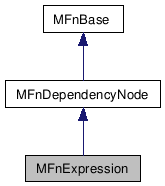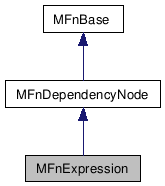MFnExpression Class Reference
[OpenMaya - API module for common classes, FunctionSet classes]
#include <MFnExpression.h>


Detailed Description
Expression function set.This class is used to create, edit, and query expression nodes.
Public Types | |
| enum | UnitConversion { kAll, kNone, kAngularOnly } |
| Unit conversion modes. More... | |
Public Member Functions | |
| virtual MFn::Type | type () const |
| Function set type. | |
| virtual | ~MFnExpression () |
| Destructor. | |
| MFnExpression () | |
| Default constructor. | |
| MFnExpression (MObject &object, MStatus *ReturnStatus=NULL) | |
| Constructor. | |
| MObject | create (const MString &expression, MObject &object=MObject::kNullObj, MStatus *ReturnStatus=NULL) |
| MString | expression (MStatus *ReturnStatus=NULL) |
| MStatus | setExpression (const MString &expression) |
| MStatus | getDefaultObject (MObject &object) |
| MStatus | setDefaultObject (MObject &object) |
| bool | isAnimated (MStatus *ReturnStatus=NULL) |
| MStatus | setAnimated (bool value=false) |
| MStatus | evaluate (MDoubleArray &result) |
| UnitConversion | unitConversion (MStatus *ReturnStatus=NULL) const |
| MStatus | setUnitConversion (UnitConversion conversion) |
| MFnExpression (const MObject &object, MStatus *ReturnStatus=NULL) | |
| Constructor. | |
| MStatus | getExpression (MString &expression) |
| NO SCRIPT SUPPORT. | |
Protected Member Functions | |
| virtual const char * | className () const |
| Class name. | |
Member Enumeration Documentation
Constructor & Destructor Documentation
Constructor.
Class constructor that initializes the function set to the given MObject.
- Parameters:
-
[in] object The MObject to attach the function set to [out] ReturnStatus the return status
- Status Codes:
- MS::kSuccess if the function set is successfully attached
- MS::kInvalidParameter if the MObject does not represent a valid Maya object or if the function set is not allowed to attach to this MObject
Constructor.
Class constructor that initializes the function set to the given MObject.
- Parameters:
-
[in] object The MObject to attach the function set to [out] ReturnStatus the return status
- Status Codes:
- MS::kSuccess if the function set is successfully attached
- MS::kInvalidParameter if the MObject does not represent a valid Maya object or if the function set is not allowed to attach to this MObject
Member Function Documentation
| MFn::Type MFnExpression::type | ( | ) | const [virtual] |
| const char * MFnExpression::className | ( | ) | const [protected, virtual] |
| MObject MFnExpression::create | ( | const MString & | expression, | |
| MObject & | object = MObject::kNullObj, |
|||
| MStatus * | ReturnStatus = NULL | |||
| ) |
This method creates and returns a dependency node for a given expression.
A default object can be specified, but if it is not specified in the expression string then the expression string values will be used.
If the expression string is of the form "objectName.attribute = ... " then the default object parameter is not needed. If you supply a default object in this case, then it will be ignored.
If the expression has no default object then you must supply one. For example, if the expression is of the form "attribute = ...", then you must supply a default object.
- Parameters:
-
[in] expression The expression string [in] object The default object (optional - see above) [out] ReturnStatus Status code
- Returns:
- The expression node
- Status Codes:
- MS::kSuccess
- MS::kLicenseFailure application not licensed for attempted operation
- MS::kFailure
Gets the expression string for this expression node.
- Parameters:
-
[out] ReturnStatus Status code. See below.
- Returns:
- The expression string
- Status Codes:
Sets the expression string for this expression node.
- Parameters:
-
[in] expression The expression string
- Returns:
- Status Code
- Status Codes:
Gets the "default" object for the expression. Not all expressions have a default object. If there is no default object for the expression, the object will be set to MObject::kNullObject and the return status will indicate success. This is a completely legal case that the calling code should check for before blindly using the returned object.
- Parameters:
-
[out] object storage for the default object
- Returns:
- Status Code
- Status Codes:
Sets the "default" object for the expression. This allows the expression writer to not type the object name for frequently-used objects.
This method will only work for expression strings in which the object name is not specified.
- Parameters:
-
[in] object the object to be set
- Returns:
- Status Code
- Status Codes:
| bool MFnExpression::isAnimated | ( | MStatus * | ReturnStatus = NULL |
) |
If this is true, then the expression will be evaluated whenever time changes, regardless of whether the other inputs have changed.
If it is false (the default) , then the expression will only be evaluated if one or more of the inputs change.
Note, if 'time' or 'frame' are inputs, then the expression will act as if this was set to true.
- Parameters:
-
[out] ReturnStatus Status code
- Returns:
- true expression will be evaluated whenever time changes
- false
- Status Codes:
| MStatus MFnExpression::setAnimated | ( | bool | value = false |
) |
Sets the way in which the expression is evaluated.
If this is true, then the expression will be evaluated whenever time changes, regardless of whether the other inputs have changed.
If it is false (the default) , then the expression will only be evaluated if one or more of the inputs change.
Note, if 'time' or 'frame' are inputs, then the expression will act as if this was set to true.
- Parameters:
-
[in] value sets the objects evaluation type
- Returns:
- Status Code
- Status Codes:
| MStatus MFnExpression::evaluate | ( | MDoubleArray & | result | ) |
Evaluate this expression and return the result.
- Parameters:
-
[out] result the value of the expression
- Returns:
- Status code
- Status Codes:
| MFnExpression::UnitConversion MFnExpression::unitConversion | ( | MStatus * | ReturnStatus = NULL |
) | const |
Get the unit conversion status for the expression node.
- Parameters:
-
[out] ReturnStatus Status code
- Returns:
- The unit conversion state for this node
- Status Codes:
- MS::kSuccess operation successful
- MS::kFailure function set does not have a valid object
| MStatus MFnExpression::setUnitConversion | ( | UnitConversion | conversion | ) |
Set the unit conversion options for the expression node.
- Parameters:
-
[in] conversion unit conversion state for this node
- Returns:
- Status code
- Status Codes:
- MS::kSuccess operation successful
- MS::kFailure function set does not have a valid object
NO SCRIPT SUPPORT.
Gets the expression string for this expression node.
Python Notes
This method is not supported in Python. Please see the one which returns a string
- Parameters:
-
[in] expression The expression string
- Returns:
- Status code
- Status Codes: